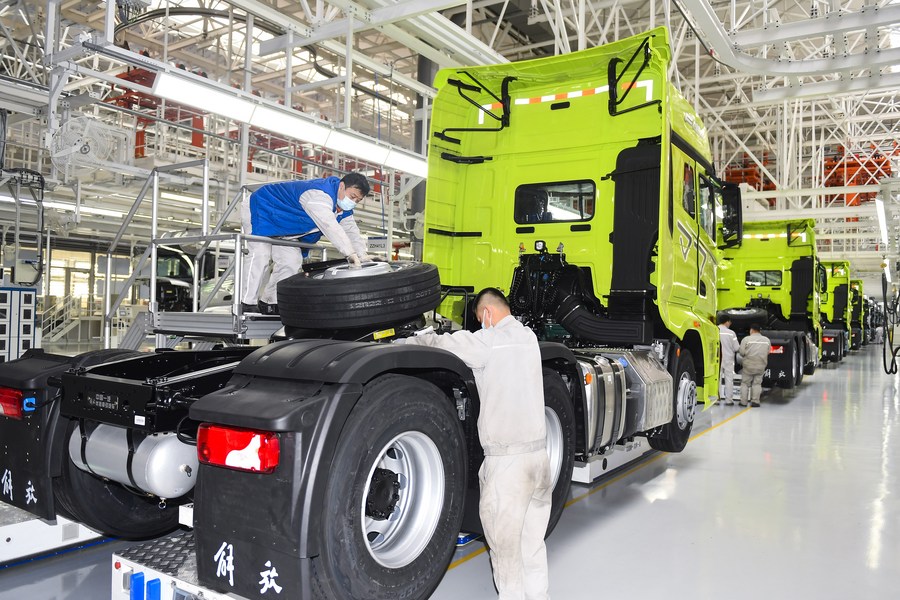
Workers work at the intelligent plant for manufacturing the FAW Jiefang J7 trucks in Changchun, northeast China's Jilin Province, Jan. 31, 2023. (Xinhua/Xu Chang)
BEIJING, Feb. 7 (Xinhua) -- In a workshop operated by Nanchang Highly Electrical Appliances Co., Ltd., a busy scene plays out behind the clamor of machines, with a new air conditioner (AC) compressor rolling off the assembly line every six seconds.
Unmanned vehicles shuttle back and forth, and over 1,400 employees roll up their sleeves to fill rising numbers of orders at the factory in Nanchang, capital of east China's Jiangxi Province.
The company saw its production orders increase 20 percent year on year in the first quarter of 2023. This was attributed to "the good momentum of China's overall economic conditions," said Wang Xin, director of the general manager's office of Nanchang Highly Electrical Appliances Co., Ltd.
Manufacturing facilities in China are rumbling back to life following the Chinese Lunar New Year holiday in late January, adding to signs that the world's second-largest economy is recovering from the COVID-19 impact.
In southwest China's Chongqing Municipality, the three factories owned by Chinese automaker Changan Auto in the Liangjiang New Area are running at full capacity, with more than 9,000 employees.
As of Jan. 31, about 360 industrial enterprises above designated size -- meaning industrial firms with an annual business turnover of at least 20 million yuan (about 2.94 million U.S. dollars) -- had resumed production in Liangjiang, and more than 140,000 workers had returned to their posts.
An array of major projects across the country have resumed construction. In Shenzhen, a manufacturing and tech hub in southern China, the first batch of 266 new projects for 2023 was launched in late January, with a total investment of 329.53 billion yuan.
The outstanding performances of many provincial-level regions since the start of the year show the huge growth potential of China's economy, said Chen Bin, an expert from the State Information Center.
"A good start in the first quarter will greatly buoy confidence in economic development throughout the year," Chen added.
According to a recent survey conducted by the China Council for the Promotion of International Trade, 99.4 percent of the foreign companies surveyed were bullish about the prospects of China's economic development in 2023.
On the first day after the holiday, production lines were active and machines were up and running at the second factory operated by SMC (China) Co., Ltd., a wholly-owned subsidiary of Japan's pneumatic component manufacturer SMC Corporation, in Beijing.
The pneumatic components manufactured there will be sold to more than 80 countries around the world. "Benefiting from various service guarantees from government departments, our revenue is steadily increasing," said Ma Qinghai, general manager of SMC Investment Management China Co., Ltd.
The company will continue to expand its investment in China and will establish an R&D center in Beijing, which will be the largest of its kind outside of Japan, according to Ma.
The long-term positive fundamentals of China's economy remain unchanged, and positive factors that drive the overall improvement of its economic performance have increased greatly, said Zhang Liqun, a researcher at the Development Research Center of the State Council.
The purchasing managers' index for China's manufacturing sector returned to expansion territory in January after three consecutive months of contraction.
The International Monetary Fund recently lifted its forecast for China's economic growth in 2023 to 5.2 percent from a previous prediction of 4.4 percent.




 A single purchase
A single purchase









